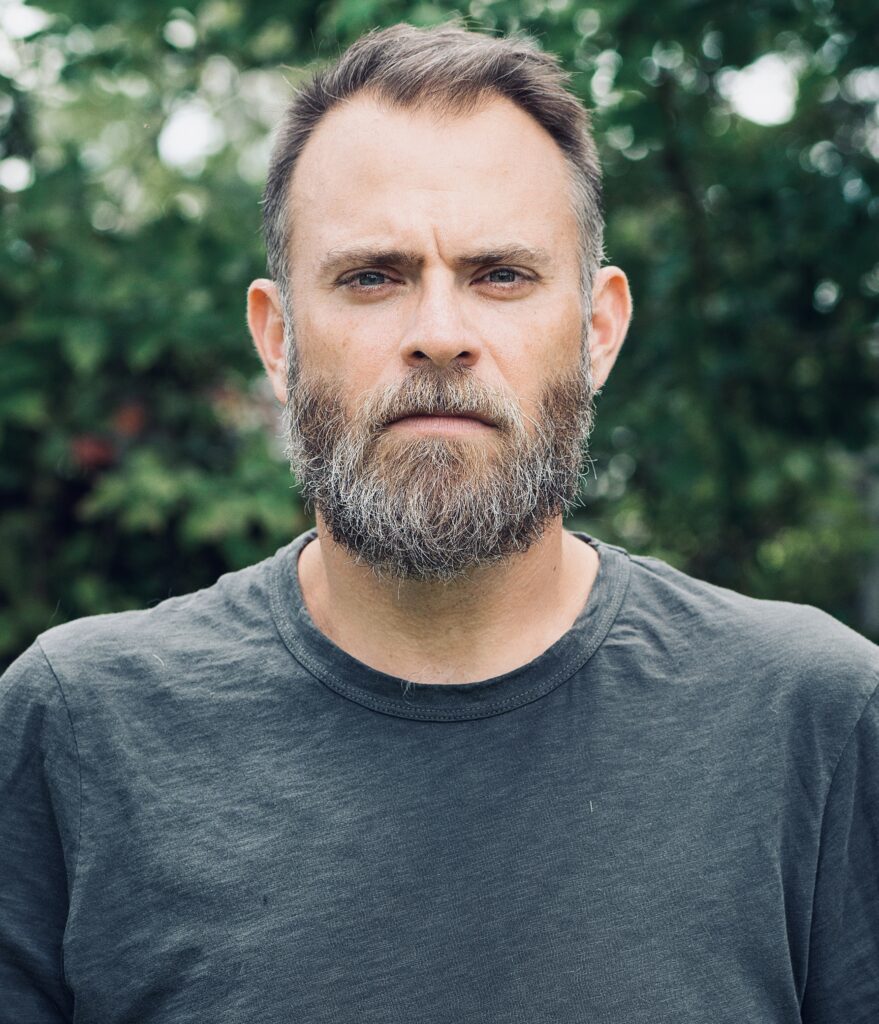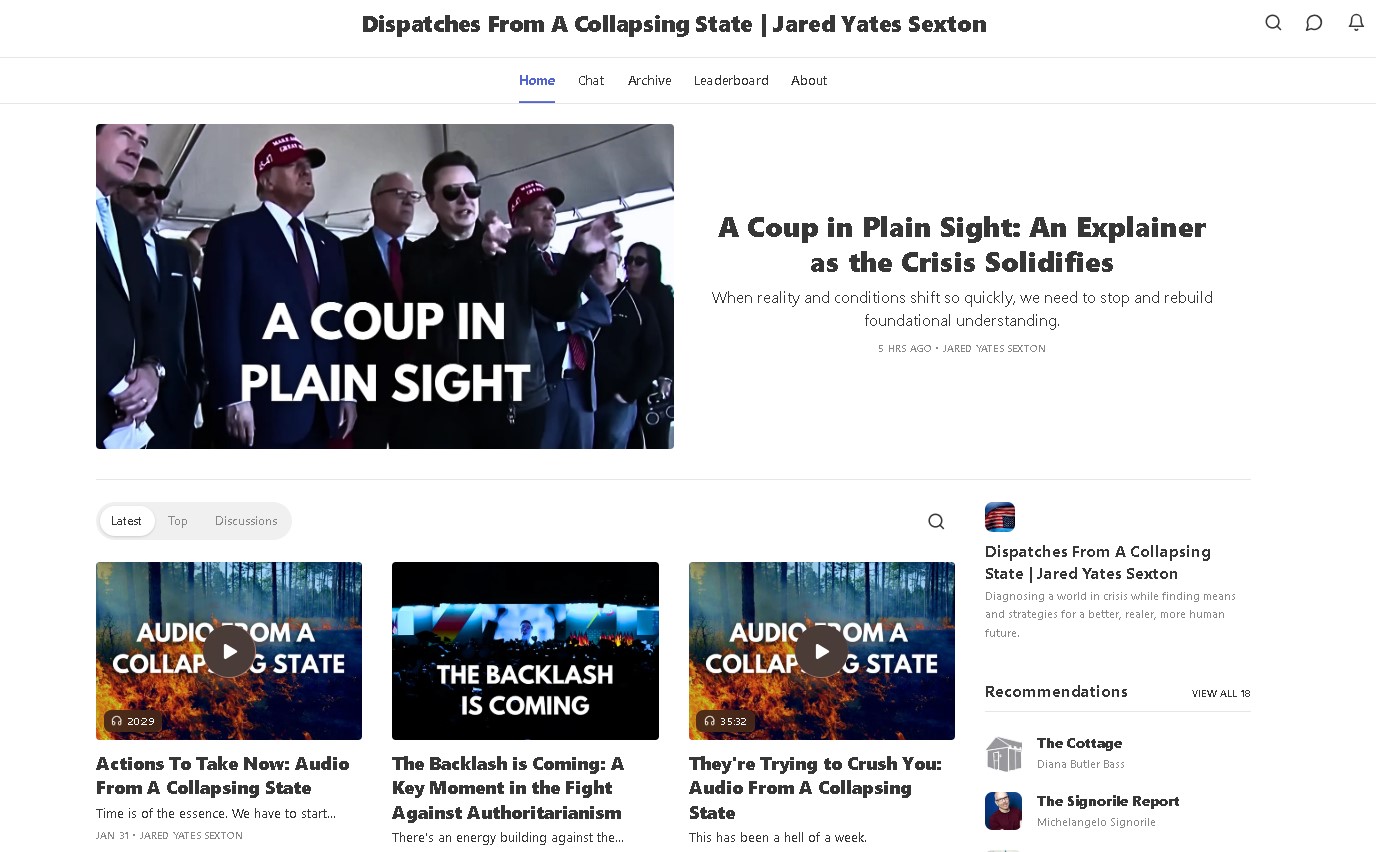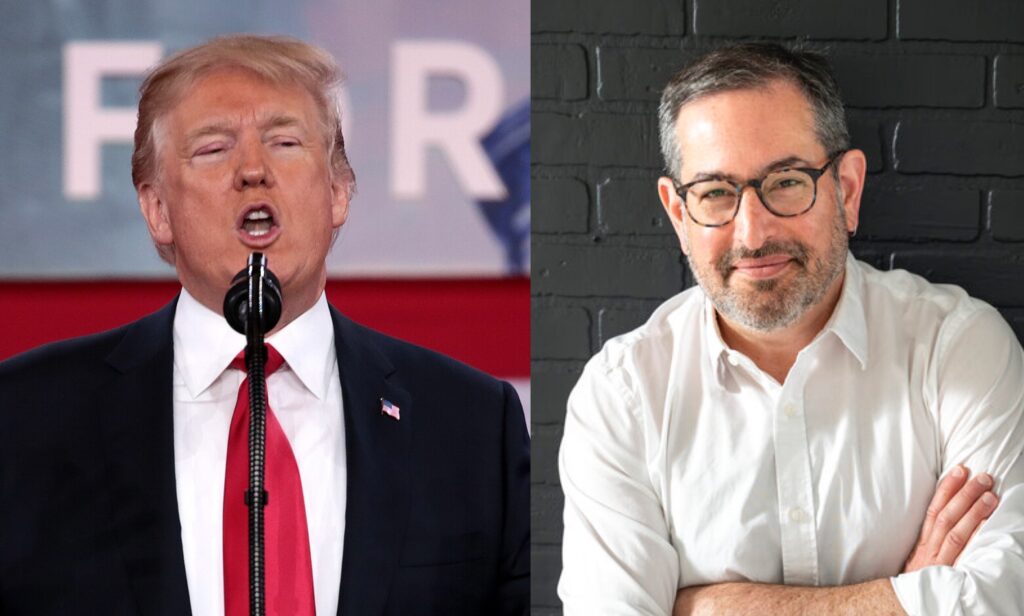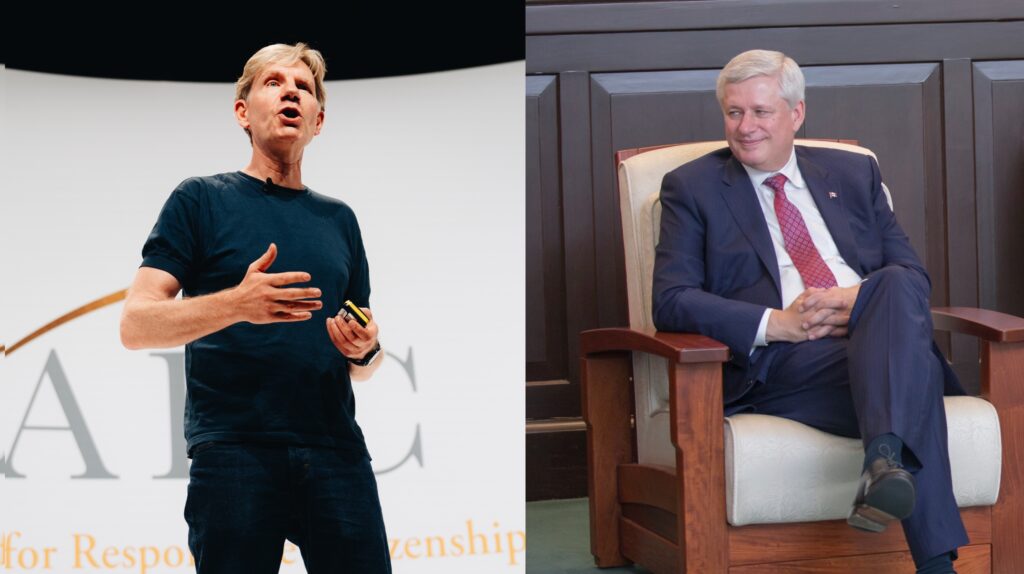It’s a ‘coup in plain sight.’
That’s political analyst Jared Yates Sexton’s verdict on the news that Elon Musk, the world’s richest man, was granted full access to the systems that handle trillions of dollars in federal payments at the weekend — despite having no official role in government.
The speed at which U.S. President Donald Trump and his tech billionaire backers have overturned democratic, legal and institutional norms since his inauguration two weeks ago has left his opponents reeling.
To help make sense of events in Washington, and parse their implications for the climate fight, DeSmog’s global investigations editor Matthew Green interviewed Sexton, who has spent years documenting the rise of authoritarianism in the U.S. and globally in his newsletter and latest book The Midnight Kingdom: A History of Power, Paranoia, and the Coming Crisis.

Combining on-the-ground reporting from campaign rallies and political conventions, with historical and psychological analysis, Sexton has long been warning of the threat to democracy posed by a second Trump administration. His Dispatches From A Collapsing State newsletter has provided a prescient account of both the new dangers posed by the combination of tech oligarchy and autocracy — and the cost of the corporate capture, empty gesture politics and strategic myopia that, in his analysis, has hobbled the Democrats.
Below is an edited transcript of Sexton’s conversation with Green, which took place on January 24 — four days after Trump assumed office. A video version can be seen at Resonant World, Green’s newsletter serving the global movement to heal individual, inter-generational and collective trauma.
Matthew Green: We’re obviously going through an epochal moment in the wake of the U.S. election. I was hoping that you could paint a picture of what you see happening, particularly from the point of view of anyone who’s interested in a safe climate future?
Jared Yates Sexton: In the work that I’ve been doing, I’ve been trying to actively organize some resistance to what’s going on. I’ve been talking to groups, whether it’s nonprofits or political organizations.
And in these conversations, what keeps getting communicated is a feeling of frustration, of fear and demoralization. We’re sitting here talking about making sure that we don’t suffer a species-type disaster — something that will make the future so much harsher and more deadly.
That is not something to actually debate. This isn’t actually even truly political; it’s not left or right. It should just be something that we have a conversation about and come together.
But while that has been politicized, people have been made to feel like there’s absolutely nothing they can do.
I just want to lay the cards on the table: To talk about climate change right now is to have a hard, demoralizing conversation at the heart of it.
That has happened for decades. But what we’re watching right now is an acceleration of the efforts to make people feel like that. I’ve heard people say, “it feels like I’m being attacked”. Well, that’s because you’re being attacked.
That’s because right now, we as individuals and we as groups, we have more or less been attacked by a group of people that have used weaponized abuse, and weaponized, terroristic intimidation tactics, to overwhelm us, to leave us in a dysregulated state — in which we don’t feel like there’s anything that we can do, that we feel alone and we feel powerless, and there’s nowhere we can possibly go.
It’s an overwhelming blitz. It is an attempt to overwhelm us and make us feel like we have already lost any type of a battle that we have to fight.
And just to go ahead and reiterate it, this is weaponized abuse.
That’s how authoritarianism works.
It’s meant to undermine any sort of resiliency that we have, or any sort of optimism, and to narrow our worlds and leave us with a choice, which is either join or get out of the way.
Matthew Green: Could you speak about how we got to this point and your analysis of the rise of authoritarianism in the U.S.?
Jared Yates Sexton: If we had unlimited time and unlimited attention, we could sit here and talk about the rise of capitalism. And you can’t fully understand how we’ve gotten to the point of this climate change threat without understanding the industrialization of the modern world, and how that went hand in hand with the accruement of resources and power among a very few people.
But for the purposes of this conversation, and the rise of authoritarianism that we’re dealing with,
I’ll just go ahead and go back to the late 1970s, early 1980s. And this was a period of time in which capitalism morphed into its current state.
The term neoliberalism gets thrown around all the time. To make it more accessible, I will say that our philosophy in the United States, also Great Britain, and all of the other supposed Western democracies, and eventually the world through the creation of global capitalism, eventually we were brought into a system in which governments that had had a requirement to keep markets in check, and to protect people who were vulnerable against the wealthy and the powerful, they changed over their philosophy to the point where they started emphasizing deregulation. They started emphasizing this aggressive profit-seeking motivation.
Eventually, the government works on behalf of the people who have the wealth and the influence.
And over time, because there’s a need for more and more profit, what you end up seeing is basic protections and liberties, as well as social programmes, they all start getting cut.
The motivation behind neoliberalism is that we’re supposed to feel more and more precarious.
We’re supposed to feel isolated from one another.
That way we don’t organize, whether it’s political organizations or labor unions.
And eventually, this terror that we all feel just starts to grow and grow and grow.
And authoritarianism, which has been used against so-called Second and Third World countries on behalf of the so-called First World countries, it boomerangs back around.
And eventually, those major powers that created this, they become subject to the exact same things that they’ve created. So now people have lost faith in liberal democracy for a good reason, to a certain extent.
Now they are looking for demagogues, who are providing easy solutions, easily identifiable political enemies, who are never the people who created the situation in the first place.
So we are now in what I would term — this is technical — a Hell of a Mess.
And basically, we have to dig ourselves out of this, recognize what has happened, and start learning from history in terms of what we can do differently.
Matthew: Could you speak also to the role of the billionaires, of the oligarchs? What is new about this particular alignment that we’re seeing?
Jared Yates Sexton: Well, we’ve seen this in the past. It just so happens that our present conditions exacerbate the problem.
So in the United States, at the turn of the 20th century, going back to industrialization, when we started having electricity, we started using fossil fuels.
We had trains bringing resources everywhere. We had to build skyscrapers in cities with steel and all that good stuff. As that took place, a lot of people started bringing together their resources and their power, and then they became exceedingly wealthy. These industrialists became known as ‘robber barons’ because they controlled our politics.
Eventually, in the 1920s, there was a moment where we had a financial collapse, and we ended up in the Great Depression. And guess what happens when these people have so much power and so much wealth and so much influence? They learn to hate democracy.
They don’t want people voting against them because it will interrupt their political agendas. And by the way, they have all this money, and all this wealth — why do they only deserve one vote, that can be canceled out by the many people who have more votes than them?
This is a cycle that just plays out over and over. We’re in a new industrial age. And with the rise of tech and the Internet, surveillance and manipulative capitalism, these people who were aided by the neoliberal project, they have more money than even the robber barons had.
Whereas the robber barons were able to control communication via owning radio stations and newspapers, they now have this new system of algorithmic technology, which basically defines every conversation that we have, how we interact with one another, but also our politics.
On top of that, they have more or less merged with our major governments.
So in the United States, the most powerful empire in the history of the world, you have to have this technology in order to carry out the functions of empire, whether it’s logistics, or how trade works, or surveillance in order to ward off threats.
So these people more or less attached to the imperial capitalist structure like leeches, and they grew very fat and very large.
And now, we are in a situation where that much wealth, that much power, and that much inequality, has created the perfect opportunity for them to take this to the next level — which is not just working in concert with the Imperial machine, but effectively taking it over, which is what individuals like this, oligarchs like these, always end up attempting to do.
We’ve entered a new chapter.
Matthew: What does this mean for the climate crisis?
Jared Yates Sexton: The majority of climate change is caused by states and militaries and corporations. So this is a growing crisis that is so overwhelming for the individual that some people are aware of it and they’re demoralized about it, they’re immobilized because they don’t feel like they can do anything.
There’s another group of people that psychologically have just come to deny it — even though deep down in the marrow of their bones, they know full and well that it’s happening.
The problem at this point is that there are no incentives whatsoever for the major powers to really do anything to push back against climate change.
You can go ahead and make the argument that there will be trillions of dollars that will need to be spent in order to take care of the damage.
Well, that’s good news for those people, because we’ve now gotten to the point where they’re not even going to give people assistance. Donald Trump is talking about getting rid of FEMA [Federal Emergency Management Agency[, which takes care of disaster areas after major disasters have happened.
They’re now pitting areas against each other.
In North Carolina, we had this massive flooding disaster where supposedly a lot of Republicans live. We just had these fires in California where a lot of Democrats live.
Well, what are they doing? They’re pitting the Republicans versus the Democrats in terms of who gets help and who doesn’t.
Meanwhile, the oligarchs are using vast amounts of resources and contributing at an unprecedented clip towards the conditions that lead to climate change.
And what have they done?
They have now taken over the government, essentially, to get more resources, more wealth, more assistance. So now they’re getting the resources that would have gone towards helping people, or creating the structures that could have helped climate change.
[These resources] are now being handed over to the tech oligarchs who have created a large part of the modern problem to begin with.
There’s another component to this, which is, instead of dealing with climate change, we are now being invited to engage in a religious-like faith that we can’t do anything about it,
But guess what? We’re gonna get off this planet, right? They’ll get us to Mars, right?
They’ll get us right off this rock before it burns to a cinder.
On top of that, everyone says, “well, we’re not addressing climate change,” but we are.
We’re putting in the structures that will allow authoritarianism to take care of the consequences.
So for instance, all of this fear in the United States of America and in Great Britain in terms of immigrants, this is about racism and white supremacy, but it’s also about creating apartheid structures so that climate refugees — who are both from outside the country in the Global South, and also Americans, and the British who are going to deal with these disasters – closed borders are going to keep people from seeking safety.
So what we’re essentially doing right now is we’re watching an unconscious [decision] among
the populace, and a conscious decision among the elite, to create the structures that are going to deal with the disastrous and violent consequences of climate change.
Matthew Green: Could you speak to the relationship between this authoritarian system and disinformation with respect to the climate crisis?
Jared Yates Sexton: I’m going to take us back to 1971. And for anybody listening or watching this and they haven’t seen it before, go and look up something called the Powell Memo.
The Powell Memo was released in the early 1970s in response to what had happened in the 1950s, 60s and early 70s. This, of course, comes from the civil rights movement, the anti-war movement, the pro-democracy movement, the feminist movement, the gay rights movement.
Basically, the wealthy looked around and they said, “we’re losing right now.”
And they decided that they were going to pool their resources and put together an operation that could then aggressively move culture.
They learned from corporate maneuvers in the past towards disinformation, including the tobacco industry, which knew that it caused cancer and hid that, but also the fossil fuel industry, which knew very early on that it was contributing to what would eventually be known as climate change.
They realized that they needed to fund a bunch of operations that could create false, skewed research that would help them, as well as to start taking over everything from universities to politics.
We now think of disinformation as social media campaigns; conspiracy theories; relatives on Facebook believing in Satanic cabals.
That is the modern narrative. But that has been seeded for decades now because the wealth class got together, and instead of changing what they were doing, and even reforming themselves and creating an environment that could have headed off climate change, they doubled and tripled down, put all the resources towards think tanks, institutes, fake experts, narrative campaigns, gaming the entire system through the media and politics.
And basically they created an alternate reality that was conducive to their profit margins.
Matthew: You wrote a really powerful post back in October, entitled Ecofascism is here, tracking some of the statements that some politicians in the U.S. were making in response to the various climate disasters, and that was even before the LA fires.
I wonder if you could elaborate a little more about what you mean by ecofascism, and how it’s playing out in the U.S.?
Jared Yates Sexton: Real quick, on the subject of the think tanks and institutes that have engaged in these campaigns, I want to make it very clear because I get asked this a lot, people say, “do they really believe what they’re doing?”
No, they don’t.
They know that climate change is real.
And you can tell that by the contradictions that are taking place.
The reason why they want Greenland? Because it’s thawing. And they know that it’s thawing and they know that there are going to be minerals and resources that are going to be advantageous to take over and hand over to the tech oligarchs.
So in the midst of all of this, what we’re seeing is sort of a dual action.
We’re seeing, on one hand, this alternate reality that’s being weaponized.
So, for instance, with the California fires, we’re being told by Republicans, and the right, and disinformation artists, that it was leftist agents setting fires so that they can realize some sort of a ‘deep state’ plot. We’ve heard Marjorie Taylor Greene [a Georgia Republican first elected to Congress in 2021] who is just like this bizarre dullard agent provocateur who talks about weather manipulation.
And people need to understand that before the Enlightenment, which is where we started looking at information and basing our decisions on empirical data, people didn’t understand what was going on.
If you would have a hurricane or you would have a flood, God was angry, right?
And so as a result, the people who suffered from it, they deserved it.
So what we are dealing with right now is something called mystification.
We are dealing with a world in which naturally occurring and man-made events are being obscured behind narratives that activate people and make them hate and want to commit violence.
So if climate change is real and everyone agrees on it, you have to deal with it. You have to make choices. And that’s going to require widespread change. It’s going to require reform. It’s going to basically require a revolutionary sea change of how we operate as a society.
It is much easier to create these narratives that will then divide people and pit them against one another, so it frees up the resources to be given to the people who are creating the problem in the first place.
So we’re now creating a situation where people are not going to receive aid. They’re not going to receive resources. And every time that this happens and there’s internal frictions and
tensions that develop, they always get vented elsewhere.
So all of a sudden you see a rising tension among nations.
You start to see people fighting for resources and land and materials and all of that good stuff.
Ecofascism is a sort of ideology in which basically the strongest survive at that point.
And you need to get together with other people, primarily behind white supremacist, patriarchal-led sort of movements, including everything from MAGA [Trump’s Make America Great Again movement] to what is now referred to as Reform in Great Britain, or Alternative for Germany, or any of these countries that you go to. At the heart of it, it is about creating the structures that will help government not actually aid people, but actually divide them, and while they’re at it, unfortunately, profit off the destruction.
Because the think tanks and institutes that you just brought up, the ones that are sowing this disinformation, not only do they know climate change is real, they’re devising ways to profit from it, which is to gobble up cheap territory, to fund private disaster relief, which is potentially a $10-trillion industry in the waiting.
So it’s the creating of an environment that is going to be conducive for the powerful who created the problem to not address the problem, while also profiting and gaining more and more power from it.
Matthew: Maybe you could speak to the state of the counterforce, if there even is one,
to these dynamics, because they can sound so overwhelming? Is there any possibility of turning this around?
Jared Yates Sexton: The problem is that there is at this moment not an organized opposition or alternative. There is no real push at this point to say, not only can we address climate change, but by addressing climate change, we will have a better, healthier, more fair society.
It’s also the fact that people are not able to save any money anymore. They’re not able to buy homes. They’re not able to enjoy life the way that they used to.
It’s the deterioration and the decline that we’ve been talking about. They get paid less.
They work more. They’re mistreated.
On top of that, their neighborhoods and their communities are being destroyed.
And they’re being left in the lurch as this happens.
They also feel alone. They also feel powerless. They also feel that they don’t have a purpose.
It’s a big interconnected knot, that’s the issue.
And just to lay out some straight hard talk very quickly: The fact is that opposition to this has now been centered into a nonprofit world where you have to choose what you’re doing.
So it’s like, “well, I’ll take care of climate change. Well, I’ll take care of food deserts. I’ll take care of healthcare.”
Well, the truth is that all of those disparate movements are all interconnected, and they are now all trying to fight over the resources that would be delivered by the people who created the problem in the first place, and decide who it is that gets funded or otherwise.
This should be taken care of by government. This should be taken care of by leaders. It shouldn’t even have to be the current situation that we’re in.
What gives me hope is this: One, that we’re having a conversation like this. That a lot of us are coming together. We’re comparing notes.
Two, it is the lack of trust in institutions. People say to me, can you believe how Donald Trump has made us distrust institutions? No, Donald Trump was made possible by an existing distrust in institutions, an earned distrust, which is that capitalism controls all of these institutions, and it has since their very beginning. So when you take a look at that, all of a sudden you start to realize all these things are interconnected.
The labor movement that is currently growing — that is going to undergo incredible travails,
and there are going to be battles between them and the oligarchs that we’ve been talking about.
There are community mutual aid organizations that are trying to take care of the consequences of what we’ve talked about, and are preparing for things like climate change.
And by the way, the people who support people like Donald Trump, the people who support this authoritarianism, a lot of those people have been misled. They do not understand that Donald Trump and these right-wing organizations, that they are being controlled by the wealth class. They’re against that wealth class. They understand intuitively and emotionally and personally what has happened: They just haven’t had political representation that has fought for them.
We’re now looking at a tipping point in which we’re going to see whether or not people recognize their interconnected struggles, and start piecing together this exploitative framework that has hurt all of them together. We’re seeing people start to dialogue about it.
The question now is: What are the oligarchs and what are the authoritarians going to do to try and head that off?
And it is going to be a battle, but I remain optimistic that eventually we are going to win that battle.
Matthew: We touched earlier on the role of trauma underlying this whole story.
Jared Yates Sexton: To just go into my own experience. I was raised in an extremely abusive childhood, so when Donald Trump goes out, and he is abusive to members of the press, he invites people in the audience to enjoy humiliating people, and enjoy the suffering of other people, what I recognize are family dynamics, psychological dynamics.
And what we find when experts have taken a look at this, is that people who embrace authoritarianism, they were raised often in abusive environments, abusive communities, abusive religions, whatever you want to call it, however it happened.
In order to survive in an abusive environment, as a child, you have to take parts of yourself that offend the abusers and make them small and destroy them.
What is happening is that a lot of people don’t think they deserve better. They think that what is currently happening with authoritarianism is what they deserve. They’re actually being invited to engage in sort of a manic fantasy world in which America is now great, or Great Britain is now great because it left the European Union.
All of these things are just going further and further into an enabling fantasy that keeps them from recognizing that they have hurt within themselves, that is making them act irrationally and against their own interests.
And they are being enabled, and through the cycle, enabling this cycle of abuse.
And so many people are completely unaware of how these sort of born-in systems that have been placed upon us and heaped upon us, they change how we behave.
And our politics never, ever touches on any of this.
Matthew: There is a hunger for change a recognition that there is something deeply wrong, and there should be a better future available?
Jared Yates Sexton: I think a really important thing for people to remember before we finish up is this. All scams, grifts, and cults answer an actual need,
And it’s important to understand that things like MAGA or Reform or any of these right-wing groups that are lying to these people, that they are being accepted by many of them because people are desperate. And it’s almost like dying of thirst and accepting dirty water, over having nothing at all.
And there is an opportunity here, and there is a place that we can make a difference.
And we can win this fight.
For more analysis and books from Jared Yates Sexton, please visit Dispatches From A Collapsing State.
Subscribe to our newsletter
Stay up to date with DeSmog news and alerts







